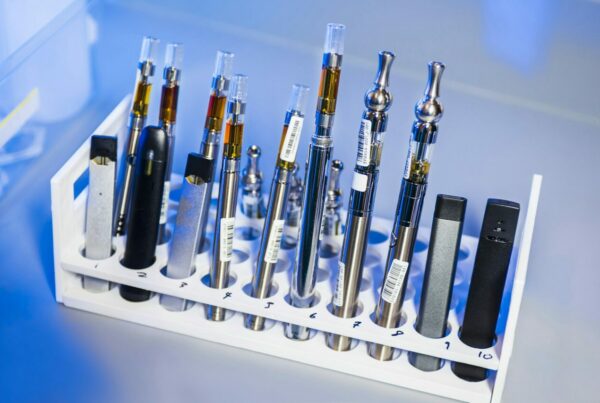N, N-Dimethyltryptamine (DMT) is a compound usually found in both flora and fauna, known for its intense yet short-lived psychedelic impact when ingested.
There’s growing evidence that naturally occurring DMT in the human body plays crucial roles in the peripheral and central nervous systems, possibly serving as a neurotransmitter.
DMT can trigger strong psychedelic responses, but it typically doesn’t result in many harmful effects, except for the potential cardiovascular risk when administered in high doses through injection.
Let’s explore DMT and its various roles, ranging from recreational usage to its intriguing prospects in scientific exploration and therapeutic uses.

DMT in a Nutshell: What Is It?
| Characteristic | Description |
| Name | N, N-Dimethyltryptamine (DMT) |
| Type | Indole alkaloid |
| Presence | Naturally found in various plants and animals |
| Psychoactive Effects | Brief, potent psychedelic experiences upon ingestion. |
| Method of Intake | Can be inhaled, injected, or consumed orally. |
| Duration of Effects | Short duration, typically between 5 and 30 minutes. |
| Chemical Structure | Composed of a tryptamine core with two methyl groups attached to the nitrogen atom of the amine. |
| Metabolism | Rapidly metabolized by the body, degraded by monoamine oxidase (MAO). |
| Cultural Usage | Historically used in diverse ceremonial and shamanic rituals by native cultures. |
| Alternative Names | Dimitrifantasiabusinessman’s tripBusinessman’s special45-minute psychosisspiritual molecule |
The Role of DMT in Mental Health
N, N-Dimethyltryptamine (DMT), a compound famed for its powerful psychedelic effects, is gaining attention for its potential role in mental health. Despite its conventional reputation for inducing profound visionary experiences, recent research suggests a connection between DMT and mental well-being.
Effects on Psychological and Emotional Well-being
DMT is renowned for its psychedelic effects, which can evoke strong emotional reactions and alter states of consciousness. This has the potential to pave new therapeutic paths to address mental health issues, aid in emotional processing, and offer new perspectives on personal traumas.
Neuroplasticity and Brain Function
Research suggests that DMT might influence neuroplasticity, thereby enhancing the brain’s ability to change and reorganize. Investigating its impact on synaptic plasticity and neural connectivity could provide potential treatments for conditions resulting from neural maladaptation.
Prospective Therapeutic Applications for Mental Health Disorders
Initial research underscores the potential of DMT in treating conditions such as depression, addiction, and PTSD. Its ability to induce mystical or spiritual experiences could offer a novel path to psychotherapy and help in altering negative thought patterns.
Investigating the natural presence of DMT in the body has revealed its significance in mental health resilience, stress response, and overall psychological well-being. Understanding how the body manages internal DMT levels could lay the groundwork for novel therapeutic strategies.
DMT and Mental Health Disorders
| Mental Health Disorder | Description | Efficacy of DMT | Benefits |
| Depression | A mood disorder marked by persistent sadness, apathy, and reduced motivation | Preliminary studies suggest DMT might alleviate symptoms by inducing deeply emotional experiences. | Its rapid onset and ability to stimulate transformative experiences could provide innovative therapeutic strategies for reshaping negative thought patterns and enhancing emotional processing |
| Post-Traumatic Stress Disorder (PTSD) | A mental health disorder triggered by traumatic events, resulting in flashbacks, severe anxiety, and intrusive thoughts | Emerging research points to the potential of DMT in managing symptoms by inducing spiritual or mystical experiences that could help patients reframe traumatic memories | DMT’s potential to induce altered states of consciousness could aid in facilitating emotional processing and offering a fresh perspective on traumatic experiences |
| Addiction | A complex disorder characterized by compulsive engagement in rewarding stimuli despite adverse consequences | Some research suggests a role for DMT in breaking addictive patterns and reducing substance cravings | The ability of DMT to stimulate powerful and transformative experiences could assist individuals in modifying their behavioural patterns and addressing addiction |
Approach to Utilizing DMT
DMT, renowned for triggering short but intense psychedelic journeys, can be administered in a number of ways. The chosen method often rests on the desired intensity and longevity of the experience.
Inhalation:
When inhaled through a pipe or vaporizer, DMT requires meticulous temperature control to avoid overheating and combustion of the substance. The onset of the psychedelic journey is almost instant when DMT is inhaled, usually lasting from 5 to 15 minutes.
Oral Consumption:
Oral consumption of DMT leads to slower onset effects that last considerably longer, often several hours. This is due to DMT’s slower metabolism when mixed with an MAOI.
Injection:
DMT can be injected directly into the bloodstream for fast and intense effects.
This approach results in an immediate and intense journey, but it necessitates precise dosage control and involves higher risks.
Insufflation (Sniffing):
Sniffing DMT results in a slower onset of effects compared to inhalation, but it might provide a more prolonged experience.
Sublingual or Buccal Use:
When absorbed through the oral mucous membranes, this method offers an alternative to inhalation and delivers a longer, albeit less intense, journey.
Determining Therapeutic Dosage: N, N-Dimethyltryptamine (DMT)
For inhalation, the suggested dose is between 20 to 40 mg, while for intravenous use, the recommended dose is 0.2 to 0.4 mg per kg of body weight. These dosage guidelines are mainly pertinent to clinical research and are particularly significant for intravenous use.
- Higher doses administered intravenously are associated with profound visuals, temporary loss of control, and a combined state of anxiety and euphoria
- Interestingly, lower doses have exhibited less desirable effects
- Recreational doses of inhaled DMT generally range from 40 to 50 mg, occasionally extending up to 100 mg
- Different doses for intravenous Users have reported significant and enduring enhancements in their psychological well-being linked with near-death experiences from DMT (7, 14, 18, and 20 mg solutions).
Availability of DMT Products
Osmosis – 4-ACO-DMT Ethereal Essence Tincture
This tincture is formulated with 4-Acetoxy-N, N-dimethyltryptamine (4-AcO-DMT), a derivative of DMT. Being a liquid extract intended for oral use, this specific product might offer a distinct experience compared to regular DMT.
Lucid Supply Co. – 5-MeO DMT Vaporizer
This product is a vaporizer that delivers 5-Methoxy-N, N-dimethyltryptamine (5-MeO-DMT). The primary ingredient, 5-MeO-DMT, is renowned for its intense, transformational, and typically brief experiences.
Integral Alchemist – Acacia – 1ml DMT Vape Cartridge
Integral Alchemist’s DMT vape cartridge is pre-loaded with N, N-Dimethyltryptamine. This product is likely aimed at those who favor a discreet and convenient way of DMT consumption.
Deadhead Chemist – 5-Meo-DMT Cartridge
This cartridge houses 5-Methoxy-N, N-dimethyltryptamine (5-MeO-DMT), a substance known for its deep and powerful impacts.
There are potential mental health benefits that may be associated with personal growth, spiritual experiences, or therapeutic uses designed to enhance emotional well-being.
Deadhead Chemist – N, N DMT Cartridge
Another offering from Deadhead Chemist, this cartridge contains the classic N, N-Dimethyltryptamine. Cartridges provide a user-friendly approach to DMT consumption, offering a more controlled and consistent experience.
In Conclusion
The utilization of N, N-Dimethyltryptamine (DMT) in
What’s the best way to use DMT for mental health?
It is crucial to make informed decisions, which includes conducting extensive research and understanding the effects of the compound.
Insights from mental health professionals or experienced users can provide valuable information regarding potential risks and advantages.
It’s also essential to understand your personal tolerance and mental readiness, and to ensure a supportive and safe setting for the experience.
Mental health therapy is a fascinating and complex journey. The ability of the compound to induce intense but short-lived psychedelic experiences opens up new therapeutic approaches.
Early research indicates its potential role in emotional processing, personal development, and possibly
The profound implications of mental health therapy require careful deliberation and responsible usage.
If you are keen on responsibly exploring DMT products, reliable sources like Schedule35 Canada Online Dispensary can provide guidance and offer various options.
Frequently Asked Questions:
How do different DMT products affect mental health?
For instance, vaporizers may yield immediate results, while tinctures or vape cartridges may provide more controlled and consistent doses.
Integrating derivative compounds or 5-MeO-DMT can result in varying degrees of intensity and diverse effects on mental health.
These minor differences underline the importance of selecting a DMT product based on individual preferences and mental health goals.
Can DMT lead to enduring changes in mental health and personal growth?
There’s anecdotal evidence that suggests DMT-induced experiences could have long-lasting effects on mental health and personal development.
Profound or transformational experiences, such as those akin to near-death, are often associated with reports of persistent positive changes in psychological health and personal growth.
While these experiences are intense and transient, they often result in self-reflection, spiritual revelations, and a sense of unity or enlightenment.
Users often describe a rejuvenated perspective on life, increased emotional resilience, and a heightened sense of life appreciation following these experiences.
How does DMT stack up against other psychedelic therapies such as psilocybin or LSD for mental health treatment?
DMT’s effects, duration, and intensity vary when compared to other psychedelics like psilocybin or LSD. It is particularly noted for its short duration.
Short-acting, high-intensity psychedelics like DMT require unique therapeutic approaches in mental health settings. These differ from the strategies employed for longer-lasting psychedelics.
Recommended Further Reading:





